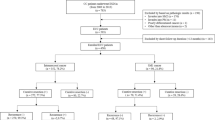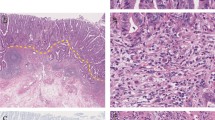Abstract
A clinicopathological analysis of the risk factors for lymph node metastasis was performed in 177 patients with submucosal invasive colorectal carcinoma (CRC). The submucosal deepest invasive portion was histologically subclassified as well (W), moderately (M), or poorly (Por) differentiated. M type was further subdivided into moderately-well (Mw) and moderatelypoorly (Mp) differentiated. The pattern of tumor growth was classified as polypoid growth (PG) and non-polypoid growth (NPG). Lymph node metastasis was detected in 21 (12%) of the 177 patients. Macroscopically, type IIc and IIa+IIc lesions showed a significantly higher incidence of lymph node metastasis (44% and 30%) than type IIa and I (4% and 8%). Regarding the histologic subclassification, Por and Mp lesions showed a significantly higher incidence of lymph node metastasis (67% and 37%) than W and Mw lesions (4% and 14%). NPG tumors showed a significantly higher incidence of lymph node metastasis (29%) than PG tumors (7%). The depth of submucosal invastion and lymphatic invasion (ly) were also significantly correlated with incidence of lymph node metastasis (submucosal scanty (sm-s) invasion 4%, massive invasion 20%; ly(+) 23%, ly(−) 5%). None of the lesions with both sm-s invasion and of W or Mw type showed lymph node metastasis. These results indicate that submucosal invasive CRC with both sm-s invasion and of W or Mw type, which shows no ly, is the appropriate indication for endoscopic curative treatment.
Similar content being viewed by others
References
Ishi H, Tatsuta M, Tsutsui S, et al. Early depressed adenocarcinomas of the large intestine. Cancer 1992;69:2406–2410.
Abulkalam MS, Kato Y, Kunishima N, et al. Carcinoma in nonpolypoid mucosa of the large intestine. Report of a case with significance in strategies for early detection. Cancer 1985; 56:2849–2854.
Kuramoto S, Oohara T. Flat early cancers of the large intestine. Cancer 64;1989:950–956.
Adachi M, Muto T, Morioka Y, et al. Flat adenoma and flat mucosal carcinoma (IIb type). A new precursor of colorectal carcinoma? Report of two cases. Dis Colon Rectum 1988; 31:236–243.
Francoise M, Francois D, Bertrand N, et al. Failure of endoscopic detection of a de novo carcinoma of the colon in patient with adenomatous polyps. Gastrointest Endosc 1992; 32:703–706.
Oseki Y, Saiga T, Matsubara N, et al. Depressed type mucosal cancer of large intestine with converging mucosal folds. Report of a case. Dig Endosc 1992;4:153–158.
Byron EC, Wayne FS. Small nonpolypoid carcinomas of the large intestine. Cancer 1983;51:1760–1763.
Kudo S. Endoscopic mucosal resection of flat and depressed types of early colorectal cancer. Endoscopy 1993;25:455–461.
Karita M, Tada M, Okita M, et al. Endoscopic therapy for early colon cancer: The “strip biopsy” resection technique. Gastrointest Endosc 1991;85:128–132.
Haruma K, Sumii K, Inoue K, et al. Endoscopic therapy in patients with inoperable early gastric cancer. Am J Gastroenterol 1990;85:522–526.
Usui Y, Kondo K, Satou T, et al. A case of type IIc colon cancer having submucosal venous invasion without direct submucosal invasion (in Japanese). J Jpn Soc Colo-proctol 1991; 44:1089–1092.
Shatney CH, Lober PH, Gilbertsen VA, et al. The treatment of pedunculated adenomatous colorectal polyps with focal cancer. Surg Gynecol Obstet 1974;39:845–850.
Shinya H, Cooperman A, Wolff WI. A rational for the endoscopic management of colonic polyps. Surg Clin North Am 1982;65:861–867.
Christic JP. Poypectomy or colectomy? Management of 106 consecutively encountered colonic polyps. Am Surg 1988;54:93–99.
Langer JC, Cohen Z, Taylor BR, et al. Management of patients with polyps containing malignancy removed by colonoscopic polypectomy. Dis Colon Rectum 1984;27:6–9.
Morson BC, Whiteway JE, Jones EA, et al. Histopathology and prognosis of malignant colorectal polyps treated by endoscopic polypectomy. Gut 1984;25:437–444.
Bartnik W, Butruk E, Orlowska J. A conservative approach to adenomas containing invasive carcinoma removed colonoscopically. Dis Colon Rectum 1985;28:673–675.
Conte CC, Welch JP, Tennant R, et al. Management of endoscopically removed malignant colon polyps. J Surg Oncol 1987; 36:116–121.
Wolff WI, Shinya H. Definitive treatment of “malignant” polyps of the colon. Ann Surg 1975;182:516–525.
Shlomo K, Louis RB, Philip HG, et al. The care of patients with colorectal polyps that contain invasive adenocarcinoma. Cancer 1992;70:2044–2050.
Minamoto T, Mai M, Ogino T, et al. Early invasive colorectal carcinomas metastatic to the lymph node with attention to their nonpolypoid development. Amm J Gastroenterol 1993;88:1035–1039.
Santhat N, Arun R, Herbert MR, et al. The risk of lymph node metastasis in colorectal polyps with invasive adenocarcinoma. Dis Colon Rectum 1991;34:323–328.
William OR, William AW, Steven JM, et al. Patient management after endoscopic removal of the cancerous colon adenoma. Ann Surg 1987;205:665–672.
Coverlizza S, Risio M, Ferrari A, et al. Colorectal adenomas containing invasive carcinoma. Pathologic assessment of lymph node metastatic potential. Cancer 1989;64:1937–1947.
Teixeira CR, Tanaka S, Haruma K, et al. The clinical significance of the histologic subclassification of colorectal carcinoma. Oncology 1993;50:495–499.
Tanaka S, Haruma K, Tatsuta S, et al. Proliferating cell nuclear antigen expression correlates with the metastatic potential of submucosal invasive colorectal carcinoma. Oncology 1995;52:134–139.
Jass JR, Sobin LH. Histological typing of intestinal tumours. In. WHO (eds) International histological classification of tumours. 2nd edn. Berlin Heidelberg Tokyo: Springer, 1989; 29–40.
Haggitt RC, Glotzbach RE, Soffer EE, et al. Prognostic factors in colorectal carcinomas arising in adenomas: Implication for lesions removed by endoscopic polypectomy. Gastroenterology 1985;89:328–336.
Shimoda T, Ikegami M, Fujisaki J, et al. Early colorectal carcinoma with special reference to its development de novo. Cancer 1989;64:1138–1146.
Muto T, Nishizawa M, Kodaira S, et al. Risk factors of lymph node metastasis of colorectal submucosal carcinoma: A quantitative analysis of 857 cases (in Japanese). Stomach and Intestine 1991;26:911–918.
Teixeira CR, Tanaka S, Haruma K, et al. Proliferating cell nuclear antigen (PCNA) expression at the invasive tumor margin predicts malignant potential of colorectal carcinomas. Cancer 1994;73:575–579.
Author information
Authors and Affiliations
Rights and permissions
About this article
Cite this article
Tanaka, S., Haruma, K., Teixeira, C.R. et al. Endoscopic treatment of submucosal invasive colorectal carcinoma with special reference to risk factors for lymph node metastasis. J Gastroenterol 30, 710–717 (1995). https://doi.org/10.1007/BF02349636
Received:
Accepted:
Issue Date:
DOI: https://doi.org/10.1007/BF02349636




